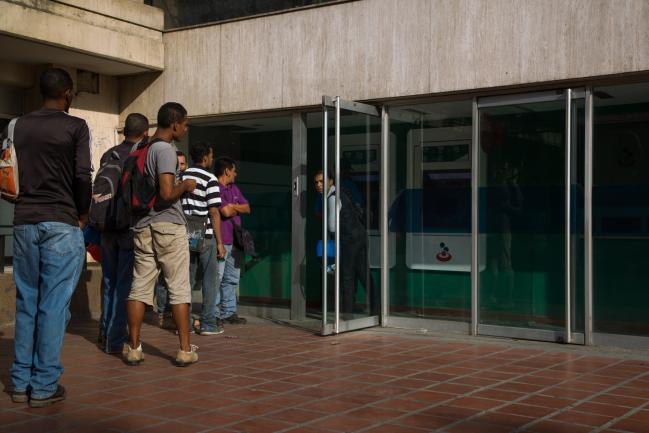(Bloomberg) -- Depositors started lining up outside Banesco Banco Universal’s branches in eastern Caracas early Friday morning, hoping to get cash -- and answers -- after Venezuela’s government seized the nation’s largest privately held bank.
Half a dozen police officers carrying assault weapons stood outside the landmark emerald-glass headquarters of the institution known as Banesco after news of what authorities called a 90-day intervention and arrest warrants for 11 top executives. The government claimed Thursday the bank speculated on the exchange rate and smuggled paper money out of the country, freezing about 1,000 accounts. The bank’s billionaire director, Juan Carlos Escotet, said the government knows about the accounts only because they were properly reported.
The dramatic move comes just weeks before President Nicolas Maduro’s bid for re-election, in which he’s painted himself as a paladin of socialism. The government says it’s detained more than 130 criminal bankers and executives and now it controls one of the last independent financial institutions. But the economy remains in the throes of quadruple-digit inflation. There are grinding shortages of food and medicine, weeks without running water and hours-long power outages. Now, Banesco’s 8 million clients wonder whether they can touch their scant remaining resources.
Grabbing Bills
“I’m here to get as much cash out as I can, though I don’t expect much because we know there’s no cash to be found,” said Marcos Palmero, a 30-year-old power-company worker waiting outside a branch in El Rosal. “The government has bankrupted everything and now they want to take Banesco and blame it for the country’s terrible situation.”
Banesco has drawn the government’s ire as prices surge and cash becomes scarce. In videos and a letter posted to his Twitter account, Escotet said he would fly to Caracas from Portugal to “face the matter” and personally attend to the case. He also questioned the government’s motives as political and a distraction from plans to redenominate the bolivar in June by lopping off three zeroes from all bills.
Baseless Action
“Banesco has been unjustly intervened in due to political motivation,” said Escotet, a Venezuelan who has investments in Europe. "There are no financial motives for this intervention.”
About 31 banks operate in Venezuela, according to their trade association. The biggest, Banco de Venezuela, has been state run since former President Hugo Chavez nationalized it in 2008, taking over from Spain’s Banco Santander (MC:SAN) SA. At the time, he paid Santander $1.1 billion, or about 95 percent of the unit’s book value at the artificially strong official exchange rate. Banesco, which has faced constant threats of nationalization, would be unlikely to get such a deal now, as oil production falls to 1980s levels and Maduro struggles to obtain new financing in the face of U.S. sanctions.
“Logic should tell them not to intervene the country’s largest private bank, with an economic crisis like Venezuela’s, foreign debt that puts it on the edge of default, collapsing oil production and hyperinflation,” said Alejandro Caribas, a banking consultant and former national superintendent. "What the country needs is to generate trust to attract foreign investment and secure long-term loans."
Money Worries
Questions of currency define everyday Venezuelan life as the bolivar plunges toward worthlessness. Officially, greenbacks trade at 69,000 bolivars per dollar, but can fetch about 800,000 on the black market.
For more than a decade, Venezuela has maintained a complicated web of price and currency controls. Authorities periodically crack down on businesses and individuals, sending official price checkers into shopping malls and super markets.
Last month, Vice President Tareck El Aissami announced the sprawling probe into supposed speculators and hoarders as inflation accelerates and Venezuela endures its fourth consecutive year of recession. Maduro has claimed that the crisis isn’t the fault of bad policy, but rather an “economic war” led by his foes.
The government said its seizure of the bank aims to “clean it” of financial crimes. Deputy Finance Minister Yomana Koteich will head the administrative board during the intervention.
“Our goal is to restore confidence to those who want to invest in the country,” Chief Prosecutor Tarek William Saab said on state television Thursday. “No one, be it a banker or a tycoon, can act in such a way without justice being served.”
Earlier this year, the ruling socialist party’s second-in-command, Diosdado Cabello, said the government was going to begin talks to purchase the bank, which Escotet later denied. In April, the Maduro government said it had launched an "administrative investigation" into Banesco on suspicions of facilitating unverified bank transfers amid a clampdown on the widely used black market. Then, on Thursday, the ax fell.
“The government says this is only a 90 day intervention, but I don’t believe them,” Palmero said, holding files close to his chest outside a bank at 8 a.m. “They’ve said the same about others, and they just took them."
